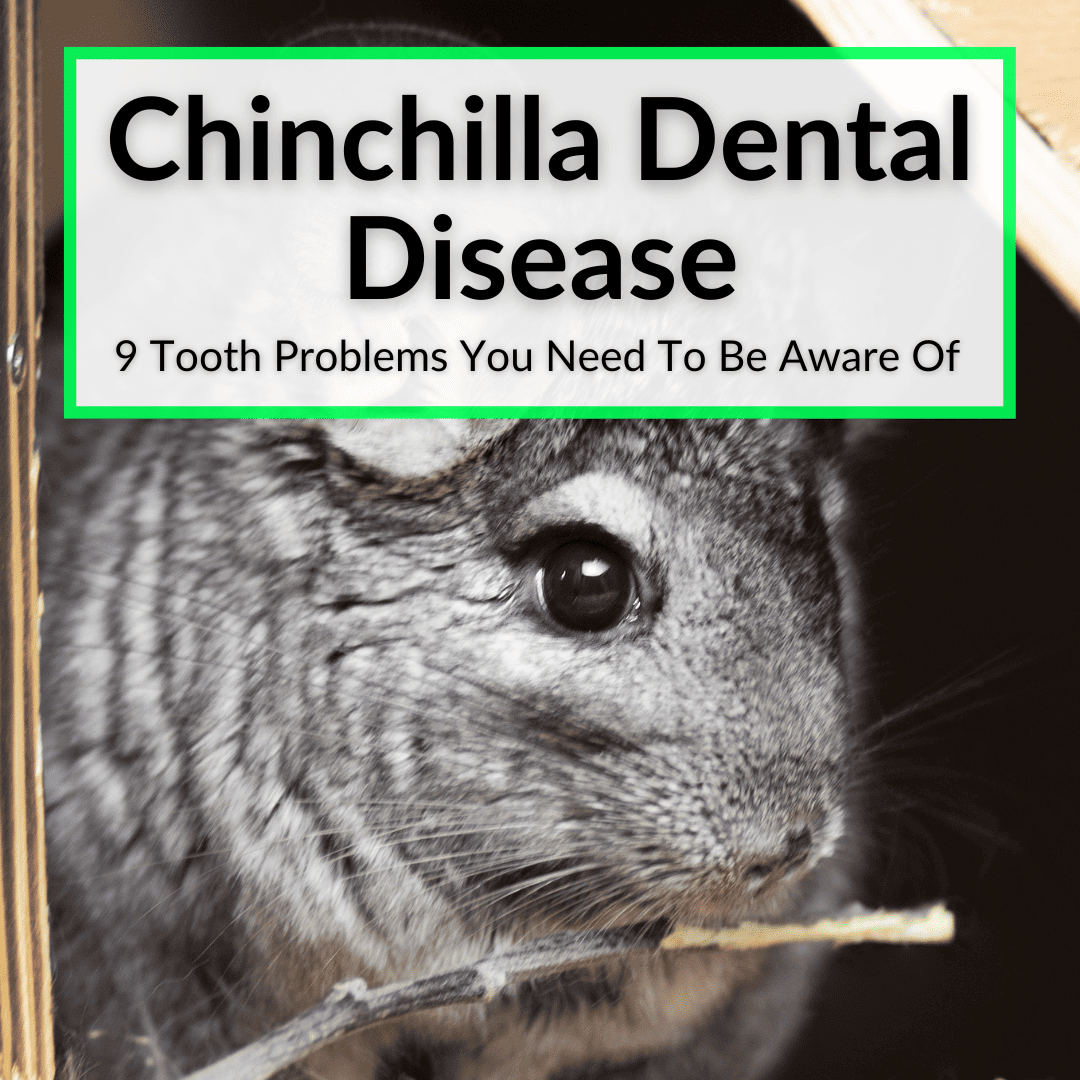
Chinchilla teeth problems are unfortunately fairly common.
These cute little rodents are susceptible to dental issues.
There are a number of reasons for this, which we will touch on below.
Before we do that, we want to go over the 9 most common dental problems in chinchillas.
We’ll cover the causes, symptoms and remedies of each.
For most tooth problems, you’ll want to take your pet to see a vet. These issues can get quite serious fairly quickly.
Contents
- 1 Chinchilla Dental Disease
- 2 Are Chinchillas Susceptible To Dental Disease?
- 3 How Do You Fix Chinchilla Teeth Problems?
- 4 Chinchilla Teeth Problems: Final Thoughts
Chinchilla Dental Disease
Chinchillas have open-rooted, continuously growing teeth. They have 20 teeth in all. This includes two pairs of continuously growing incisors on the upper and lower jaws, totaling four incisors.
Behind the incisors, they have premolars and molars. There are two premolars on each side of the upper and lower jaws, with six molars that are similarly placed, adding up to a total of four premolars and twelve molars.
The premolars and molars help chinchillas grind and chew their food to aid in digestion. As mentioned, chinchillas do tend to suffer from tooth problems. Let’s take a look at the 9 most common chinchilla dental diseases.
Overgrown Teeth
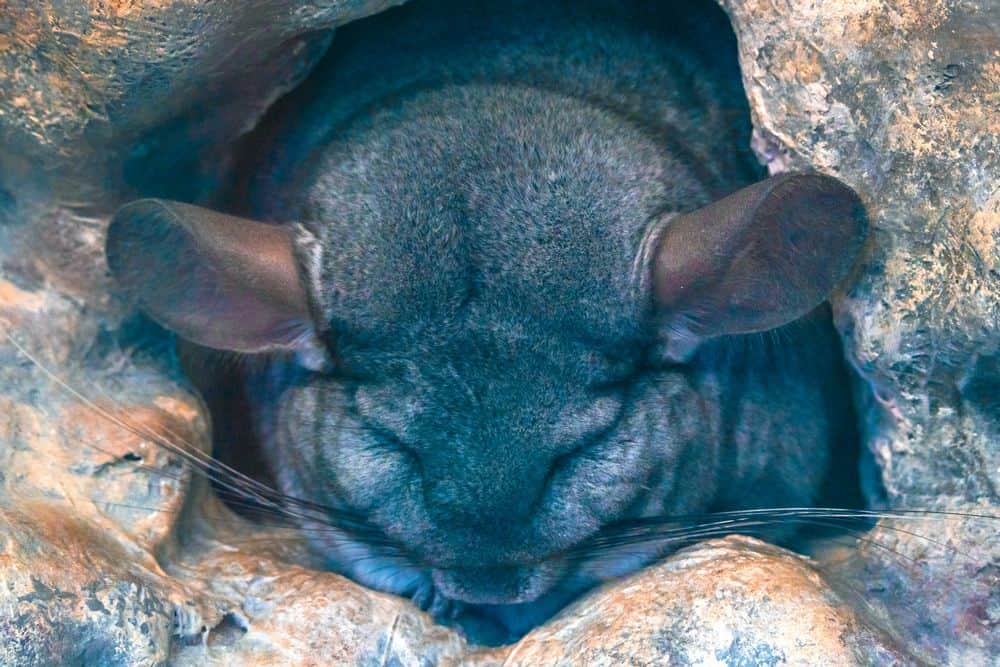
A chinchilla has open-rooted teeth. This means that their teeth keep growing continuously. These rodents need to do a lot of chewing and gnawing to keep their teeth worn down.
Wild chinchillas grind down their teeth by chewing on roots, grass, hay, tree bark, and ground cover. Captive chinchillas that do not get adequate roughage could face the issue of overgrown teeth.
Causes
- Inadequate roughage
Signs And Symptoms
- Pain while eating
- Weight loss
- Drooling
- Misalignment of the jaws
- Stained fur under the chin and jaws
Treatment
- Provide your chinchilla with plenty of roughage (Timothy hay), wooden toys, dental chews, chew toys, etc
- Feed it roughage and fiber to help grind down the teeth
- If the problem persists, your vet might surgically trim the teeth under anesthesia
Malocclusion
Malocclusion in rodents like chinchillas can be primary or secondary. Primary malocclusion is a congenital condition, while secondary is the result of trauma.
Causes
- Primary malocclusion is usually seen in very young chinchillas under the age of one year. The kit may be born with teeth that do not grow evenly. A poor diet can further exacerbate the condition.
- Secondary malocclusion in chinchillas can occur due to trauma, such as falls or biting the wire of the cage.
Signs And Symptoms
- Difficulty eating
- Weight loss
- Drooling which causes stained fur
- Misaligned or overgrown teeth
- Damaged or chipped teeth
Treatment
You must not ignore malocclusion, because it can cause dental fractures, preventing surgical removal of the misaligned teeth.
- Provide plenty of healthy chew toys, hay, etc.
- Feed your pet grated vegetables or softened pellet food.
- If needed, get the vet to regularly trim your chinchilla’s teeth (with specialized dental burrs) every few weeks. The vet may remove the damaged teeth under anesthesia for a more permanent solution.
Dental Abscesses
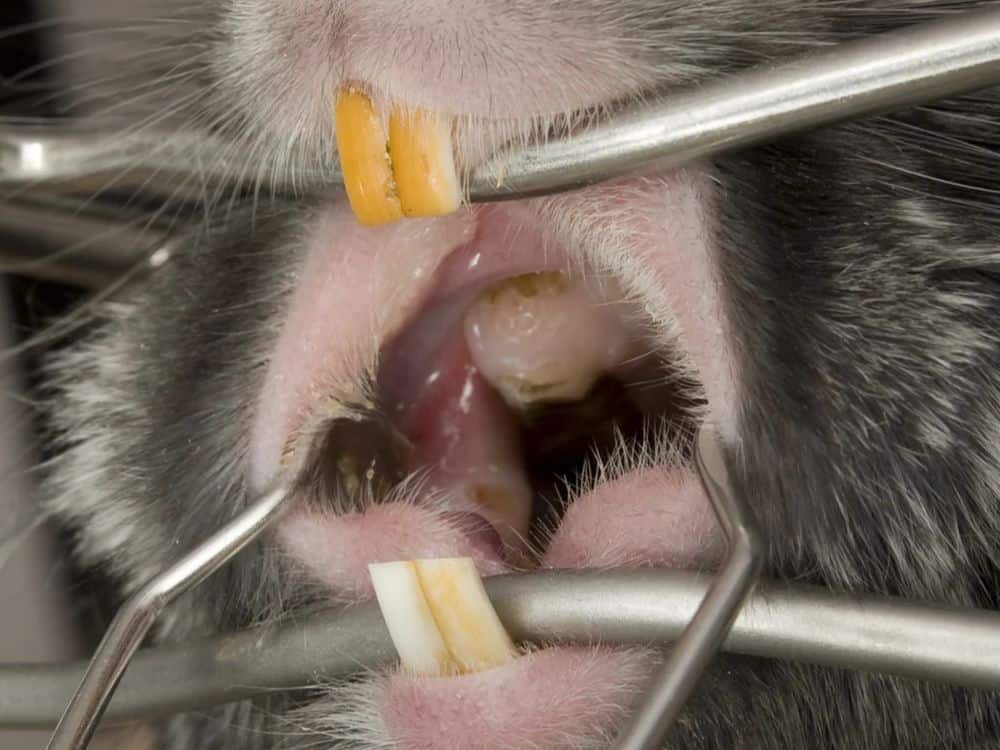
A dental abscess is a painful infection that occurs at the root of a tooth or in the space between the teeth and gums. It is caused by bacteria that enters the tooth or gum through a crack, cavity, or other opening.
Causes
Untreated dental issues like malocclusion, overgrown teeth, and bacterial infections from oral trauma could result in dental root abscesses.
Signs And Symptoms
- Odor/bad breath
- Facial swelling
- Eye issues
- Pawing the face
- Pus and bleeding or discharge
- Pain while eating
- Loss of appetite
- Weight loss
Treatment
- Extraction of the affected tooth
- Antibiotics and pain medication, as advised by your vet
- Softened pellets, grated veggies, and/or syringe-feeding during healing
Broken Teeth
Broken teeth are just what they sound like. There can be a number of causes for a broken tooth.
Causes
- Trauma
- Fights with cage mate
- Chewing on inappropriate objects like wires
Signs And Symptoms
- Difficulty eating
- Pain
- Bleeding
- Drooling
- Stained fur
- Pawing the face
- Eye problems
- Oral infections
Treatment
- Extraction of the broken tooth or teeth
- Soft pellets, grated vegetables, and/or syringe-feeding during healing
- Pain medication as advised by your vet
Gingivitis
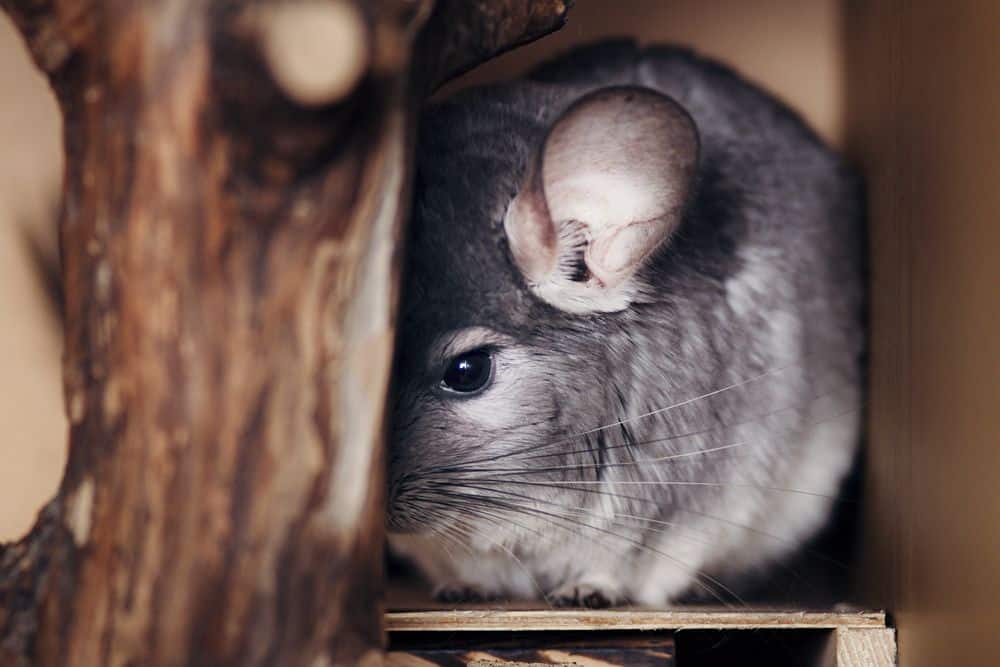
Gingival erosions and gingivitis are more common in chinchillas than in rabbits and other rodents.
Causes
- Inadequate chewing due to improper diet
- Bacterial infections
- Poor oral hygiene
Signs And Symptoms
- Red, swollen gums
- Bleeding gums
- Foul odor/bad breath
Treatment
- Dietary changes – softened pellets, grated vegetables, or syringe-feeding formula
- Oral/injectable antibiotics
Periodontal Disease
Periodontal disease is a common dental issue in chinchillas that occurs when plaque and tartar build up on the teeth and gums, leading to inflammation and infection.
Causes
- Less abrasive diet
- Genetic causes
Signs And Symptoms
- Difficulty eating
- Bad breath
- Loose teeth
- Swollen, bleeding gums
- Decreased appetite
- Weight loss
- Pawing at the face
- Excess drooling
- Eye problems
Treatment
- Improving diet
- Treatment by a vet under anesthesia (cleaning, root planing, polishing)
Caries (Dental Cavities)
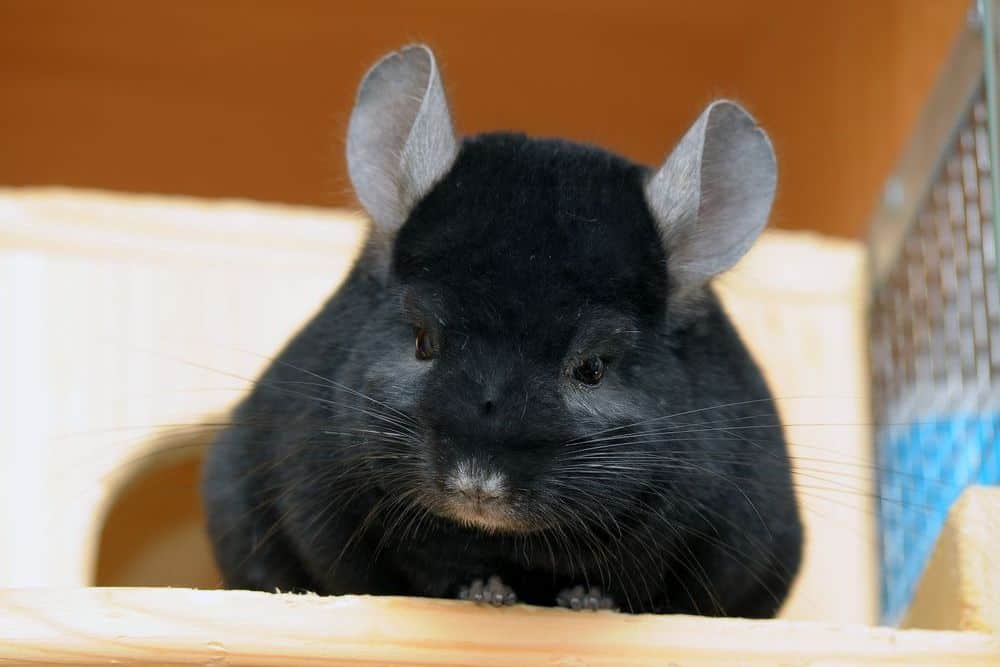
Chinchillas can suffer from cavities n their teeth just as we humans can. And the causes are similar as well.
Causes
- Inadequate hay in the diet
- Diets high in sticky or sugary treats
- Poor environment
- Stress
Signs And Symptoms
- Drooling
- Stained, matted fur around the chin
- Shift in appetite where the animal only eats its favorite foods
- Eye issues
- Changes in feces (quantity and consistency)
Treatment
- The vet might trim the affected teeth
- Switch to a low-carbohydrate diet with hay
Tooth Resorption
Tooth resorption is a condition where the tooth structure begins to break down and resorb, leading to pain and eventual tooth loss.
Causes
- Poor diet
- Other dental issues
Signs And Symptoms
- Worn, eroded teeth
- Difficulty eating
Treatment
- Dental extraction
- Dietary changes
Dental Fractures
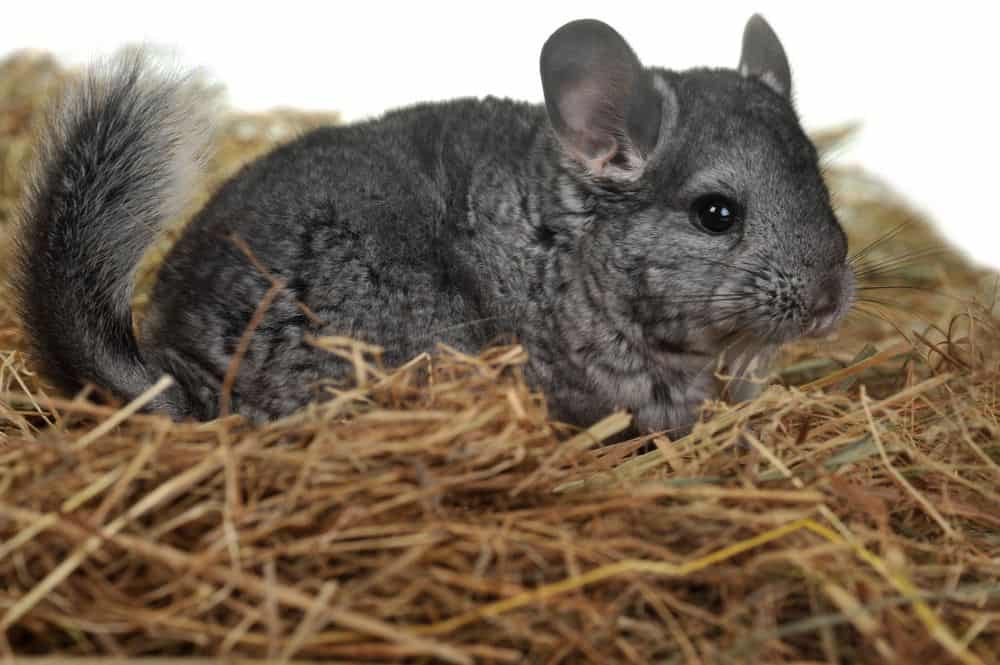
A fractured incisor is slightly different from a broken tooth, in that the fractured tooth may only be slightly broken or chipped.
Causes
- Trauma
- Fall
- Fight
- Chewing on a hard object
Signs and Symptoms
- Difficulty eating
- Pain
- Swollen face
- Drool or slobber
- Moist dermatitis around the chin and jaw (caused by drooling)
Treatment/Remedies
- The vet might attempt to trim the tooth or grind it down. Some dental fractures may need extraction under anesthesia.
Are Chinchillas Susceptible To Dental Disease?
Yes, unfortunately, this species is prone to dental diseases. There are a number of reasons they tend to suffer from tooth problems.
Continuous Tooth Growth
Since chinchillas have continuously growing teeth, they need a steady supply of roughage and fiber to gnaw on. This helps the teeth wear down. Diets lacking in roughage, hay, dental chews, and chew toys can make captive chinchillas more susceptible to dental issues.
Genetic Predisposition
Some dental diseases, like malocclusion and misaligned teeth, may be hereditary and get passed on to the chinchilla from its parents. Good breeders refrain from breeding chinchillas with dental issues.
Anatomical Features
The chinchilla is a small animal with a tiny mouth. Their tiny mouths cause overcrowding of the teeth, which also results in dental issues.
Sugary Or Sticky Diets
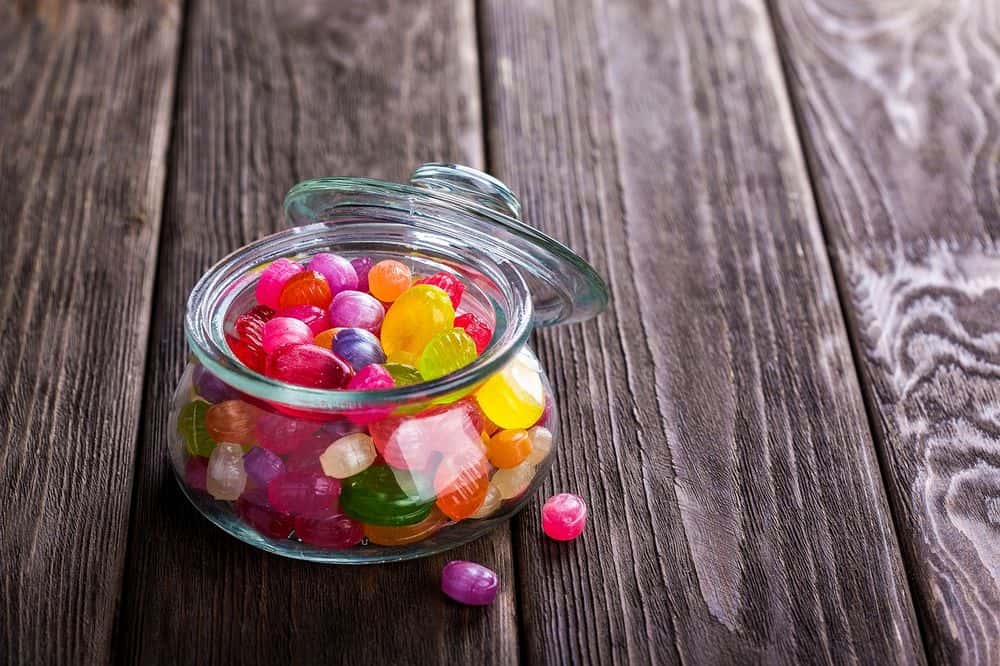
Some chinchilla owners overfeed their cute pets with inappropriate treats. Even seemingly innocuous and natural foods like fruits (dry or fresh) are high in fructose and sucrose. Excess quantities of such treats can also result in dental diseases in these pets.
Similarly, sticky foods can result in plaque, tartar, and periodontal disease in captive chinchillas. It is always best to stick to a standard diet of hay and pellets. If you want to give occasional treats, try to make them healthy treats.
How Do You Fix Chinchilla Teeth Problems?
Please do not attempt to fix your chinchilla’s dental issues at home. Please take your pet to the vet, because certain dental issues require surgical extraction, trimming, grinding, etc. These procedures are best done by an expert, usually under anesthesia.
Do not ignore serious dental health issues in chinchillas, such as malocclusions, overgrown teeth, caries, or broken teeth. Without appropriate treatment, your pet could develop secondary infections. The infections could even affect the animal’s bloodstream or vital organs.
Do not attempt to file or grind your pet’s teeth at home. Your chinchilla could get seriously injured. It could even turn aggressive and bite you. Please see your vet right away.
Chinchilla Teeth Problems: Final Thoughts
I hope this article did not scare you too much. While it is true that chinchilla teeth problems are common, if you feed your pet a healthy diet and provide it plenty of things to chew on, you can prevent most problems.
And if you get your pet from a reputable breeder, you can greatly reduce, if not eliminate, the chances of a congenital chinchilla dental disease. Then you mainly just have to worry about tooth problems due to accidents. And you can reduce the risk of tose happening, too.
Leave a Reply